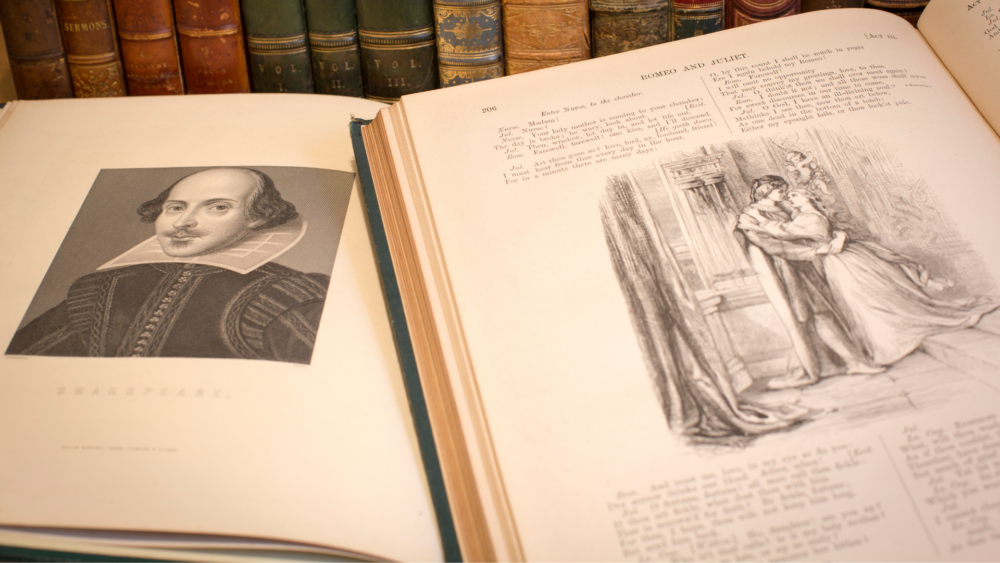John Shakespeare and Mary Arden would have been just another anonymous English family in history had it not been for one of their eight children, who became a remarkably creative author of poems and plays that would still be recited centuries after they were written.
We’re talking, of course, about none other than a great literary figure of the Western world – William Shakespeare. We thought it would be interesting to look at how much Shakespeare has influenced the contemporary English language (and, as a result, other languages – but more on that later).
Read on to discover 10 phrases Shakespeare coined, or used in his works, which four centuries later we use in everyday English.
Shakespeare’s legacy
It all began way back in 1564 in Stratford-upon-Avon, where a boy called William Shakespeare was born. Fast-forward a bit and his writing career began, it’s thought, sometime from the mid-1580s. Thanks to his powerful imagination, certainly one of his greatest strengths, Shakespeare went on to write a staggering 37 plays and around 154 sonnets in his lifetime!
Some of his most famous plays include Hamlet, Romeo and Juliet, and Macbeth. Throughout his writing, Shakespeare applied new suffixes and prefixes to words, borrowed vocabulary from foreign languages, and combined words to create new ones. The famous dramatist is thought to have created around 2,000 new words and expressions. However, it is difficult to say whether he invented all of these, or if he was the first person to use them in writing.
Anyone wishing to learn more and to be inspired by Shakespeare’s work can read his plays and poems, watch film adaptations, or, if in London, go to Shakespeare’s Globe Theatre (we certainly recommend a visit!).
It’s clear that the Bard’s contribution not only enriched the English lexicon by popularising a diverse collection of words and phrases, but also actively shaped the way that we – contemporary English speakers – communicate.
And there is a lot more than just “To be, or not to be…”, “Shall I compare thee to a summer’s day?”, or “O Romeo, Romeo, wherefore art thou Romeo?”.
Even if you are not very familiar with Shakespeare’s plays and sonnets, it is very likely that you already know quite a few phrases which originated in his work.
Check out some of the most well-known expressions the world-famous bard coined or popularised below (we’ll bet you use many of them without any further thought, or at least have heard of them all!)
1 – Love is blind
Meaning: If you are in love with someone, you can’t see their faults.
Centuries later, this is still the best explanation for unlikely couples who beat the odds.
2 – Break the ice
Meaning: To do something to relieve the tension in a situation, such as trying to engage in conversation with someone else, especially at an awkward or strained moment.
The first day in a new office, trying to patch things up with someone after an argument, the awkward silence between two people. Well, we’ve all been there, haven’t we…
3 – Wear your heart on your sleeve
Meaning: To express and communicate your feelings openly.
There are a couple of different theories for the origin of this expression, which is older than Shakespeare himself. However, Shakespeare was the first person to record it in writing. It is likely to have originated in the Middle Ages, when knights would tuck away, under their armour, something from their lady (such as a handkerchief), before fighting on horseback with jousting lances.
4 – A heart of gold
Meaning: This is used to refer to people who are extremely kind and have a generous nature.
Neil Young has crossed the ocean for one, but he’s still on the search.
5 – It’s all Greek to me
Meaning: You can’t make sense of something that is said or written.
Possibly one of the most efficient expressions we have to tell someone you can’t understand a word of what they’re saying. And it’s not only English speakers who get clueless every now and then – this useful expression has been translated into at least 30 other languages.
6 – Knock, Knock! Who’s there?
Yes, Shakespeare is the father of the knock-knock joke. This can also be used to break the ice* after an argument.
*see how easily “break the ice” comes to us when writing or speaking.
7 – All that glitters is not gold
Meaning: Just because something looks attractive, it doesn’t mean it is genuine or has any value. In other words, something that appears good on the surface but that is not actually as good when you take a closer look.
As you can see, you probably know more about the language used by Shakespeare than you had imagined.
Shakespeare in Translation
Shakespeare’s influence doesn’t stop with the English language, either. Nowadays, the Bard of Avon’s brilliant works are known around the globe thanks to the fact that they have been translated into more than 100 languages. A great example of the power of translation when it comes to disseminating and popularizing ideas, culture and concepts.
If you are looking to reach people around the world or to expand internationally, get in touch with us today to find out how we can help you, by creating the best translations for your brand. Please call us on +44 (0)20 7294 7710 or email us at info@creativetranslation.com and we’ll be happy to provide a quotation.




